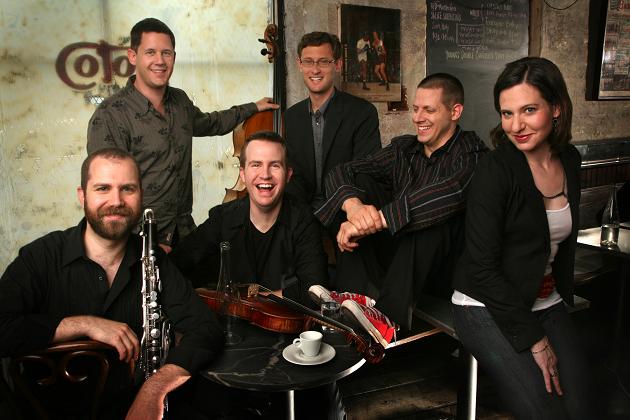Eighth Blackbird Plays Less, More, and In C
By Alexander Hough in Arts & Entertainment on Mar 22, 2012 3:30PM

Photo: Luke Ratray
Riley's piece, which premiered on November 4, 1964, is generally credited for sparking the minimalist movement in classical music. At that time, the prevailing trends, particularly among composers with posts in academia, involved complexity and dissonance or atonality. In C is drastically different. The work is made up of 53 small groups of notes. The players - Riley leaves the number open but says 35 is good - play the patterns in order, repeating them for an undetermined amount of time. Moving to the next figure is up to the individual player, but the entire ensemble is responsible for staying within a few patterns of one another. Throughout there is an eighth note pulse of Cs, an addition by composer Steve Reich, who performed on the premiere. To see the music, including Riley's instructions, click here.
The piece was revolutionary in the Western music world. It simplified music, re-emphasizing rhythm and stripping down and slowing the harmonic changes. In C is beautifully summarized by critic Alfred Frankenstein in his famous review in the San Francisco Chronicle from November 8, 1964:
The primitivistic music goes on and on. It is formidably repetitious, but the harmonic changes are slowly introduced into it; there are melodic variations and contrasts of rhythm within a framework of relentless continuity, and climaxes of great sonority and high complexity appear and are dissolved in the endlessness. At times you feel you have never done anything all your life long but listen to this music and as if that is all there is or ever will be, but it is altogether absorbing, exciting, and moving, too.
Or as composer John Adams (whose latest piece was performed in Chicago last night) put it, "It felt as if the pleasure principle had been invited back into the listening experience."
Saturday night's performance will begin at 10:00 p.m., following eighth blackbird's second concert presented in conjunction with the MCA exhibition The Language of Less (Then and Now). Saturday's early concert will begin at 7:30 p.m. and is titled The Music of More. The program, with works by Fabian Svensson, Amy Beth Kirsten, Kurt Rohde, Andy Akiho, György Ligeti, and Bruno Mantovani (all of which, except for the Ligeti, were written in the past three years), is meant to contrast with tonight's The Music of Less. That concert, which also begins at 7:30 p.m., will feature cousins and descendants of In C. Philip Glass's Music in Similar Motion, Morton Feldman's Durations I, and Alvin Lucier's Fidelio Trio share the slate with more recent pieces by Caleb Burhans, Jacob TV, Timo Andres, and David Lang. All three of these concerts are highly recommended.
The Music of Less is tonight at 7:30 p.m., The Music of More is Saturday at 7:30 p.m., $28, $22 MCA members, $10 students; In C is Saturday at 10:00 p.m., $15, $10 students ($10 and $5 with a ticket to either of the other concerts), Museum of Contemporary Art, 220 E. Chicago Ave.